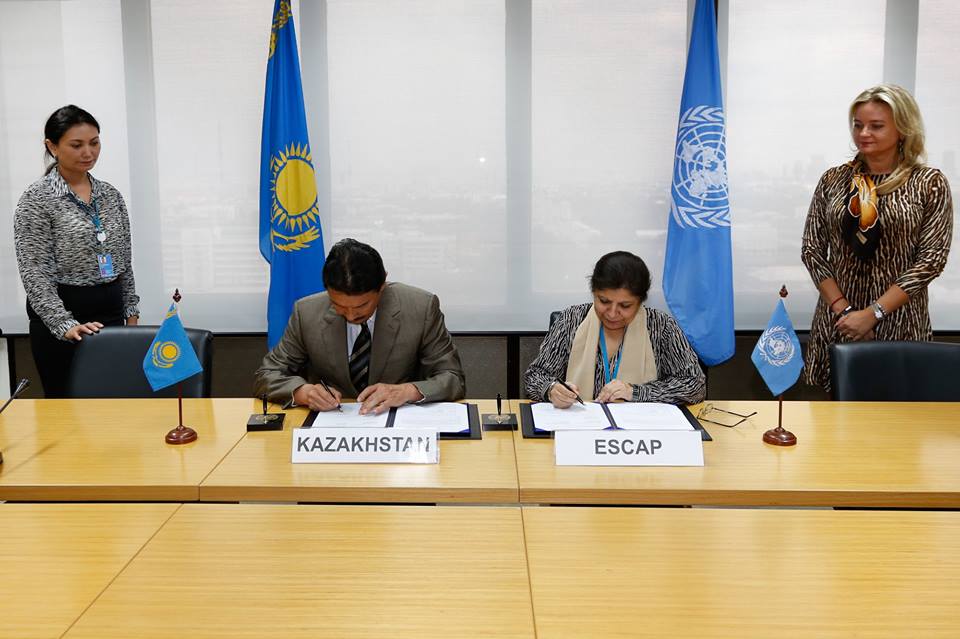BANGKOK – Kazakhstan and the United Nations Economic and Social Commission for Asia and the Pacific (ESCAP) signed a new trust fund agreement Dec. 3 that provides a $200,000 voluntary contribution to ESCAP and aims to bolster renewable energy for the Pacific Islands.

Kazakhstan’s Ambassador to Thailan Marat Yessenbayev shakes hands with UN Under-Secretary-General and ESCAP Executive Secretary Dr. Shamshad Akhtar after they signed the agreement in Bangkok on Dec. 3.
Speaking at the signing ceremony, Kazakh Ambassador to Thailand Marat Yessenbayev stressed that food, water and energy security are key priorities for Kazakhstan’s election campaign as a non-permanent member of the UN Security Council for 2017-18.
“With its large conventional energy resources, Kazakhstan is committed to the development of a green economy through diversification and development of alternative energy sources. The energy crisis and limited access to food and water are a serious threat to sustainable development and stability and deserve the world’s attention,” he noted.
Addressing the gathering, UN Under-Secretary-General and ESCAP Executive Secretary Dr. Shamshad Akhtar acknowledged the strengthened partnership and welcomed the agreement in support of renewable energy.
 The project, launched in partnership with ESCAP, focuses on the installation and rollout of sanitation and energy systems in ten small island developing states: Kiribati, Marshall Islands, Micronesia, Nauru, Palau, Papua New Guinea, Samoa, Solomon Islands, Timor-Leste and Tonga. This is based on successful experiences and lessons from existing biogas approaches in the Pacific.
The project, launched in partnership with ESCAP, focuses on the installation and rollout of sanitation and energy systems in ten small island developing states: Kiribati, Marshall Islands, Micronesia, Nauru, Palau, Papua New Guinea, Samoa, Solomon Islands, Timor-Leste and Tonga. This is based on successful experiences and lessons from existing biogas approaches in the Pacific.
The Capacity Development Trust Fund Agreement between ESCAP and the Kazakh Ministry of Foreign Affairs will support development of biogas-based renewable energy solutions in the Pacific Islands. The signing followed initial discussions between ESCAP and the Kazakh government in Astana and at the Third International Conference for Small Island Developing States, held in Samoa in September.
As stated at that conference by Kazakh Foreign Minister Erlan Idrissov,the geographic isolation of the Pacific Islands creates fundamental challenges that hinder their growth and prosperity. In a sense, Kazakhstan shares many challenges with the Small Island Developing States (SIDS).
“Just as we are land-locked, they are, in a way, sea-locked, with their encirclement by the great ocean and their remoteness from major growth hubs aggravating, not helping their lot. One of the greatest challenges they all share is a lack of energy resources and the resulting high cost of energy. And here is an area where Kazakhstan can play a concrete and constructive role and is already pursuing a number of efforts – big and small – to help meet this challenge,” Idrissov wrote in his blog after the conference.
During his trip, Idrissov shared his vision of further Kazakhstan-SIDS cooperation with the “Samoa Observer.”
“Climate change recognises no boundaries. The chaos it causes affects us all. We are already seeing in Kazakhstan the rising temperatures and more frequent severe weather that climate change is predicted to cause. We recognise, however, that for Small Island Developing States like Samoa the threat is far more severe. In some cases, it threatens the very existence of nations,” he wrote in an opinion published by that newspaper.
“We firmly believe that we have to find ways to specifically help the SIDS overcome basic and fundamental difficulties, such as those of limited freshwater, biodiversity and land resources, resulting in rapid depletion and degradation which affects waste management. The SIDS need help in reducing their heavy dependence on precious and restricted food, water and energy resources and in building their resilience to climate change, natural disasters and external shocks due to global developments,” he noted.
“We have to be ambitious in creating partnerships to share technology and best practices with countries throughout the world, no matter what their stage of development. We will only begin to tackle climate change successfully when it can be done without putting the brakes on economic growth and the prosperity it brings for our citizens,” Idrissov noted.
Thus, Kazakhstan will be hosting the international specialised exhibition EXPO 2017, which will focus on the theme of Future Energy. In three years, the country is planning to attract at least 100 countries and 10 international organisations to the event to help drive forward innovation and development in the energy sector. Kazakhstan sees EXPO 2017 as a key to bring together governments, international organisations and private business to find solutions to sustainable growth.
The Green Bridge Partnership Programme is another Kazakh initiative that brings together several countries, from Germany to Mongolia, to promote technology transfer and innovation in energy. The ultimate goal of the programme is to find common solutions to meet the energy needs of the international community. It provides measures to create conditions and infrastructure to improve access to green technology and investment and transfer of practical and successful management experience to interested countries and organisations.
The programme, initiated in 2010 by the Sixth Ministerial Conference on Environment and Development of the Asia-Pacific region in Astana, was presented the following year at Environment for Europe, the Seventh Pan-European Ministerial Conference. The Green Bridge programme for Europe, Asia and the Pacific represents 95 countries, 70 percent of the world’s population and more than 90 percent of its greenhouse gas emissions.
Kazakhstan is a key partner and emerging donor of ESCAP, providing its support to technical cooperation work in areas of environment, energy and financing for sustainable development and hosting ESCAP’s Subregional Office for North and Central Asia in Almaty.

